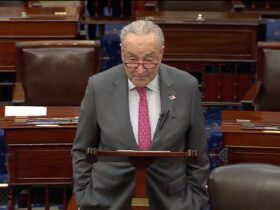In March 2025, the University of South Alabama presented its Annual Songwriter Keynote, a conversation and concert event funded, in part, by a grant from the Alabama Humanities Alliance. Gulf Coast artist Robby Amonett, pictured above, live-painted the event.
Keith Necaise/University of South Alabama and the Alabama Humanities Alliance
hide caption
toggle caption
Keith Necaise/University of South Alabama and the Alabama Humanities Alliance
Millions of dollars in previously awarded federal grants intended for arts and cultural groups across the country are being canceled by the Trump administration, according to a National Endowment for the Humanities (NEH) senior official who spoke on the condition of anonymity because they’re not authorized to speak publicly.
The funds had been awarded by the agency through a competitive application process and, according to the official, covered grants from fiscal years 2021-2025. The official said that “no upcoming awards” will be made in fiscal year 2025.
The official said Acting NEH Chair Michael McDonald told senior staff that the Department of Government Efficiency (DOGE), a team within the executive branch dedicated to reducing government spending, “wants to claw back $175 million” in grant money that has not yet been disbursed. It is not clear if that is the true amount of undisbursed funds, or an estimation by DOGE staff.
On Monday, DOGE told NEH staff that it would lay off a substantial number of employees and cut its grant programs, as first reported by The New York Times.
The NEH has not responded to a request for comment.
Groups are affected in all 50 states
Among the thousands of groups affected by the sudden cessation of funds are state arts councils, museums, historic sites, archives, libraries, educators and media outlets in all 50 states.
A “Notice of Grant Termination” that was sent to a state humanities council and obtained by NPR states, “Your grant no longer effectuates the agency’s needs and priorities and conditions of the Grant Agreement and is subject to termination.” The letter continues, “Your grant’s immediate termination is necessary to safeguard the interests of the federal government, including its fiscal priorities.”
The humanities are about helping “preserve community history and identity,” said Stephen Kidd, executive director of the National Humanities Alliance, a national umbrella organization supporting the humanities. Kidd said he’s heard from multiple recipients of Humanities grants who told him they received the letter late last night.
“We don’t know the full scope of the impact of last night’s actions,” Kidd said. “We do know that it is affecting the state humanities councils which are crucial to the vitality of humanities across the country. This is funding that was appropriated by Congress to the state affiliates of the NEH. This is funding that has been promised to the states that is now being withdrawn.”
Nearly half (42%) of the federal humanities endowment goes directly to state humanities councils.
Chuck Holmes, executive director of the Alabama Humanities Alliance and a former NPR senior editor who left the organization in 2016, confirmed receiving the letter. He said the Alliance, which serves roughly a quarter million Alabamians, was granted $1.2 million in federal funds for fiscal year 2024. While it varies from year to year, Holmes said federal dollars represent roughly 65% of its overall budget. The rest comes largely from state government funding and private sources.
State humanities councils customarily regrant NEH money to local organizations including libraries, museums, historical societies, documentary filmmakers and others.
Holmes said, since January, he and his staff have been “worried about what might happen given what has happened at the Kennedy Center and [Institute of Museum and Library Services] and word got out that a DOGE team was at the NEH.”
President Trump fired the Kennedy Center’s president and board chair as well as Democratic appointees to the board and eliminated its social impact division. The entire IMLS staff was placed on administrative leave.
“We have reserve funds that will help us get through the next few months,” said Holmes, “Without federal funding we’ll have to make drastic cuts to our programs.”
This story edited by Jennifer Vanasco
















Leave a Reply